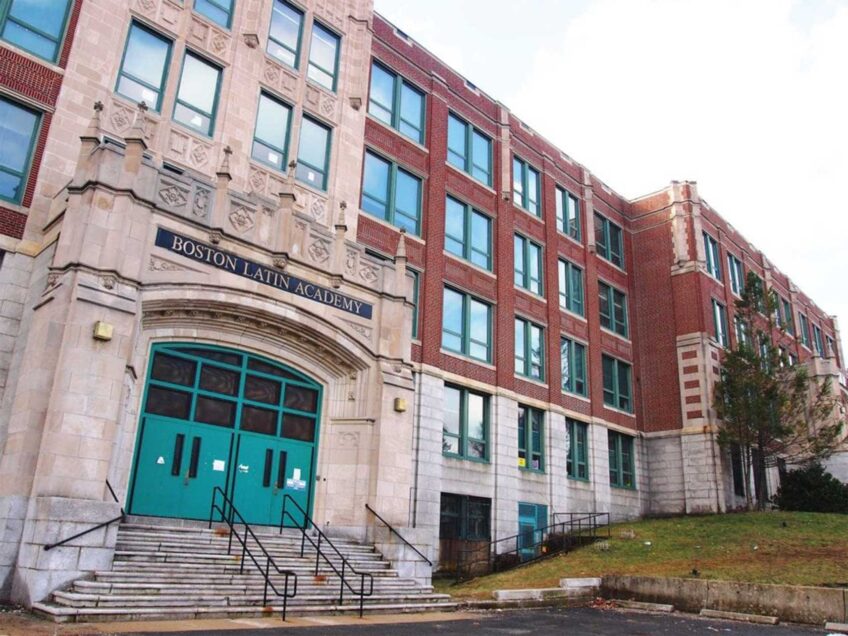More BPS budget cut fights likely next year
Walsh says changes needed before upping funding
This year’s fraught Boston Public School budget decisions — which spurred parent protests and a mass student walkout over anticipated cuts — are unlikely to become a thing of the past, Mayor Martin Walsh told the Banner.
“I think it’s going to happen again next year,” Walsh said in a sit-down interview at the Banner’s new Dorchester office.
During the past budget cycle, Walsh spoke of a need to control rising costs in the school system, while students and parents said the resulting cuts to their schools were too severe. Opinions do not seem to have shifted for either side.
Before more funding can be allocated to BPS next year, changes must be made to ensure the money is well spent, Walsh said.
“We can continue to throw money at [the school system] and have the status quo, but I’m not going to settle for the status quo,” Walsh said. “Our kids deserve better. … As we move forward here, we have to see that we spend every penny the right way.”
Others argue, however, that more money is needed not just next year, but now. And that the risk is inequity.
A solution in savings?
Walsh said the current system struggles with the absence of a cohesive model. There are too many schools with different grade levels offerings, making it difficult to find a clear transition path from kindergarten to grade 12, and there are too many varied school start times.
BPS’ 128 schools have 20 to 24 different models and 22 different start times, Walsh said
“When you try to operate a business like that, it goes out of business. Because it’s government, it doesn’t go out of business, we keep funding it,” Walsh said.
Some costs are fixed, or outside of BPS’ control. For one, BPS is required to fund transportation to charter schools and parochial schools, and does not have control over their start times.
With planning, enough savings can be achieved in transportation, use of facilities and handling of tenured teachers not assigned to their own classroom that would save enough to make a budget increase unnecessary, said City Councilor Annissa Essaibi-George, vice chair of the Committee on Education.
“We just need to be more thoughtful ahead of time on planning and make sure we’re really serving all of our students,” she told the Banner. “If we can make strides in those three areas and we can realize some significant costs savings, we don’t need to increase the budget.”
Tenured teachers not selected for permanent teaching positions are retained and placed in roles such as support or co-teaching. This fiscal year, the cost of such teachers, including benefits, is $10.6 million, according to the Boston Municipal Research Bureau. That figure accounts for one percent of the $1.013 billion BPS budget
Essaibi-George also said that, while not desirable, school closures and consolidations should remain on the table and creative uses of building space be examined. Among the potentials: permitting other activities — such as welcome centers — to keep school buildings with surplus space open.
City Councilor Tito Jackson, chair of the Committee on Education, agreed that there are some areas for savings, including through deploying unassigned teachers, reducing food waste and ensuring BPS’ consultants are not duplicating work already handled by the department.
Economics of equity
Discussions of cost savings need to include monitoring the potential for unequal impact, said Mary Battenfeld, member of the Citywide Parent Council and the parent group Quality Education for Every Student, noting that budget shortfalls fell disproportionately on children with certain types of special needs.
“To start there [with efficiencies] rather than start with advocating for adequate and equitable funding I think is wrong-headed and won’t get us there,” Battenfeld told the Banner. “The mayor’s route is a path toward school closures and implementing the McKinsey [& Company] report recommendations.”
That controversial report recommended saving money by closing and selling underutilized school buildings. It was criticized for failing to account for limits to student-teacher ratios and for counting non-classroom space in making its assessment that schools could serve more students.
Battenfeld said that while smaller schools are more expensive to run, decisions around closure or consolidation must take into account whether it will affect some students more severely. For instance, it could mean children have to travel further to school (and not all children have the option of being driven or safe areas to walk in) or that some children no longer have the choice of a smaller environment to which they may be better suited.
Some of BPS’s funding requests are driven by the cost of serving a significant number of children with high levels of needs, Battenfeld added. In his conversation with the Banner, Walsh acknowledged the challenges of serving students with a diverse array of needs, including English language learners, homeless students and children with special educational conditions.
Jackson is among those who argue that the money is there in the city’s budget, and it is a matter of political will to allocate it to schools.
“This year, young people enter school buildings with fewer resources than they did last year,” said Jackson in a phone interview. “Four schools will have no librarians. Autistic students will enter classrooms that will have more students than they did last year.”
If this funding pattern continues, students may suffer, Jackson said.
“If funding does not increase [next year], we will be moving backwards in our commitment to closing the opportunity and achievement gap.”
A dual approach
In the view of Kim Janey, senior project director and leader of the Boston School Reform Project at Massachusetts Advocates for Children, fully supporting schools will take both budget increases and cost controls.
“We need for revenue to rise and for costs to go down,” she told the Banner. “The school district should be more efficient, that’s absolutely true. That being said, all the efficiency in the world is not going to get at the resources that are needed to adequately fund and educate students in Boston.”
Ballot question 2
Many on both sides of the budgeting issue agreed that the passage of Question 2 — one of the ballot items up for consideration this November, which would raise the cap on charter schools — would exacerbate the budget strain.
Already the state has failed to fund charter school reimbursements, putting an increasing burden on the city, Walsh said. Passing Question 2 will only heighten that problem.
“If Question 2 passes, we will be in even deeper trouble than we currently are,” Janey said. “It will be devastation.”






